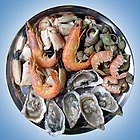– Hover over image and scroll to middle for controls to see more selected panorama images –
Introduction
| Earth's ocean |
|---|
|
Main five oceans division: Further subdivision: Marginal seas |

The ocean is the body of salt water that covers ~70.8% of the Earth. In English, the term ocean also refers to any of the large bodies of water into which the world ocean is conventionally divided. Distinct names are used to identify five different areas of the ocean: Pacific, Atlantic, Indian, Antarctic/Southern, and Arctic. The ocean contains 97% of Earth's water and is the primary component of the Earth's hydrosphere, thus the ocean is essential to life on Earth. The ocean influences climate and weather patterns, the carbon cycle, and the water cycle by acting as a huge heat reservoir. (Full article...)

A sea is a large body of salty water. There are particular seas and the sea. The sea commonly refers to the ocean, the wider body of seawater. Particular seas are either marginal seas, second-order sections of the oceanic sea (e.g. the Mediterranean Sea), or certain large, nearly landlocked bodies of water. (Full article...)
Oceanography (from Ancient Greek ὠκεανός (ōkeanós) 'ocean', and γραφή (graphḗ) 'writing'), also known as oceanology, sea science, ocean science, and marine science, is the scientific study of the oceans. It is an Earth science, which covers a wide range of topics, including ecosystem dynamics; ocean currents, waves, and geophysical fluid dynamics; plate tectonics and seabed geology; and fluxes of various chemical substances and physical properties within the ocean and across its boundaries. These diverse topics reflect multiple disciplines that oceanographers utilize to glean further knowledge of the world ocean, including astronomy, biology, chemistry, geography, geology, hydrology, meteorology and physics. Paleoceanography studies the history of the oceans in the geologic past. An oceanographer is a person who studies many matters concerned with oceans, including marine geology, physics, chemistry, and biology. (Full article...)
Selected article -

The Northwest Passage (NWP) is the sea lane between the Atlantic and Pacific oceans through the Arctic Ocean, along the northern coast of North America via waterways through the Arctic Archipelago of Canada. The eastern route along the Arctic coasts of Norway and Siberia is accordingly called the Northeast Passage (NEP). The various islands of the archipelago are separated from one another and from Mainland Canada by a series of Arctic waterways collectively known as the Northwest Passages, Northwestern Passages or the Canadian Internal Waters.
For centuries, European explorers, beginning with Christopher Columbus in 1492, sought a navigable passage as a possible trade route to Asia, but were blocked by North, Central, and South America, by ice, or by rough waters (e.g. Tierra del Fuego). An ice-bound northern route was discovered in 1850 by the Irish explorer Robert McClure. Scotsman John Rae explored a more southerly area in 1854 through which Norwegian Roald Amundsen found a route, making the first complete passage in 1903–1906. Until 2009, the Arctic pack ice prevented regular marine shipping throughout most of the year. Arctic sea ice decline, linked primarily to climate change, has rendered the waterways more navigable for ice navigation. (Full article...)Interesting facts -
- Croatian oceanographer Mira Zore-Armanda had difficulty gaining passage on research vessels because she was a woman.
- The Swedish American Line was the first transatlantic shipping company to operate a diesel-engined ocean liner.
- American actress Susan Oliver, after surviving a plane crash that almost ended her life, became the first woman to fly a single-engined aircraft solo from New York City across the Atlantic Ocean.
Selected list articles and Marine habitat topics
| Marine habitats |
|---|
| Coastal habitats |
| Ocean surface |
| Open ocean |
| Sea floor |
- List of oceans
- List of ancient oceans
- List of seas
- List of circumnavigations
- List of cruise lines
- List of largest lakes and seas in the Solar System
- List of marine biologists
- List of marine ecoregions
- List of maritime explorers
- List of naval battles
- List of ocean liners
- List of oceanographic institutions and programs
- List of oldest surviving ships
- List of rogue waves
- List of seafood dishes
- List of submarine topographical features
Tasks
 |
Here are some tasks awaiting attention:
|
General images -
Related portals
In the news
- 12 April 2024 – Iran–Israel proxy conflict
- Germany tells its citizens to leave Iran immediately, saying that "air, land and sea transport routes" will likely be affected by military action in the region. (Reuters)
- 8 April 2024 – Russian invasion of Ukraine
- Ukraine claims to have damaged the Russian Navy missile ship Serpukhov in the Baltic Sea near Kaliningrad. (Kyiv Independent)
- 1 April 2024 –
- North Korea fires a ballistic missile into the Sea of Japan near South Korean territory. (AP)
- 31 March 2024 – Visa policy of the Schengen Area
- Bulgaria and Romania partially join the Schengen Area, allowing travel by air and sea without border checks, Austria vetoed travel by land without border checks over fears that non-EU citizens could get easier access to the European Union. (France 24)
- 28 March 2024 – 2023–24 South-West Indian Ocean cyclone season
- Cyclone Gamane makes landfall in Madagascar, killing at least eleven people and causing widespread flooding, according to local officials. (AP)
WikiProjects
Topics
Categories
Associated Wikimedia
The following Wikimedia Foundation sister projects provide more on this subject:
-
 Commons
Commons
Free media repository -
 Wikibooks
Wikibooks
Free textbooks and manuals -
 Wikidata
Wikidata
Free knowledge base -
 Wikinews
Wikinews
Free-content news -
 Wikiquote
Wikiquote
Collection of quotations -
 Wikisource
Wikisource
Free-content library -
 Wikiversity
Wikiversity
Free learning tools -
 Wiktionary
Wiktionary
Dictionary and thesaurus
Admiralty law
| Admiralty law |
|---|
| History |
| Features |
| Contract of carriage/Charterparty |
| Parties |
| Judiciaries |
| International conventions |
| International organizations |
Need assistance?

Do you have a question about oceans, seas or oceanography that you can't find the answer to? Consider asking it at the Wikipedia reference desk.
External media

- World Ocean Database and World Ocean Atlas Series – from the U.S. National Centers for Environmental Information, National Oceanic and Atmospheric Administration. Includes the World Ocean Atlas.
- European Atlas of the Seas – the European Atlas of the Seas, from the European Commission
- NOAA Research – NOAA research news, Oceanic and Atmospheric Research (OAR)
- Ocean Research – from The World Ocean Observatory
- Ocean Biodiversity Information System – "a global open-access data and information clearing-house on marine biodiversity for science, conservation and sustainable development"
-

-

-

-

-
Random portal
Purge server cache








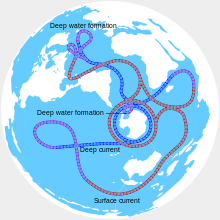












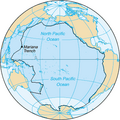













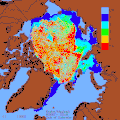






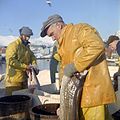

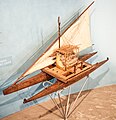

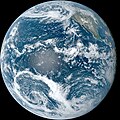





















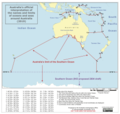


























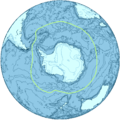






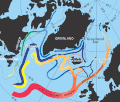










![Image 108"Terres Australes" [sic] label without any charted landmass (from Southern Ocean)](https://upload.wikimedia.org/wikipedia/commons/thumb/8/8e/Geography_world_map.jpeg/120px-Geography_world_map.jpeg)







